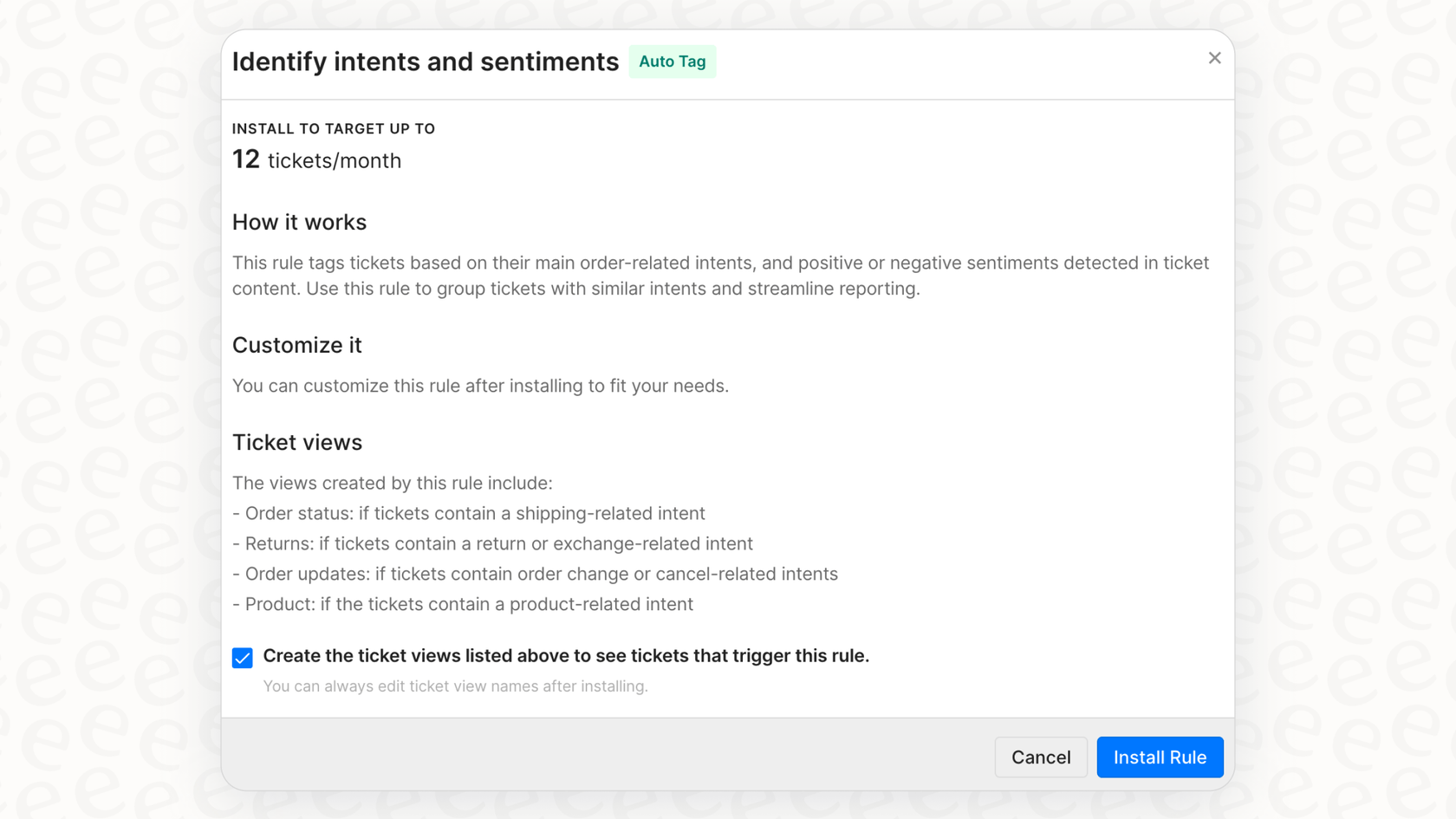How to set up Gorgias automation to reopen a ticket when a customer replies on SMS

Kenneth Pangan

Stanley Nicholas
Last edited January 16, 2026
Expert Verified

Managing SMS conversations in Gorgias is an excellent way to stay connected with your customers. It's a fast, direct channel, and with a few automation rules, you can ensure a perfect workflow. When a customer replies to a conversation you've already closed, you want to be sure that message is seen immediately to maintain a high-quality experience.
Gorgias provides a structured and reliable way of deciding whether a reply reopens an old ticket or creates a new one. By understanding how this system works, you can set up Rules that ensure your agents always have the right context and never miss a follow-up.
This guide will show you exactly how to use Gorgias's built-in Rules to handle these replies. We'll go over how to manage reopened tickets, identify follow-ups that arrive as new tickets, and discuss options for when you want to add further intelligence to your platform.
What you'll need to get started
Before we jump in, let’s make sure you have everything ready to go. It’s a simple process, and you’ll want to have these three things handy:
-
An active Gorgias account with admin access. You'll need it to create and refine your Rules.
-
The Gorgias SMS channel installed and ready. If you haven't set it up yet, you can easily add it from the Gorgias App Store.
-
A rough idea of how your team should handle these SMS follow-ups. Who is the best team for these replies, and what is your goal for response times?
How to set up Gorgias automation for SMS replies
Alright, let's look at how to use Gorgias Rules to keep your SMS follow-ups organized.
Step 1: Understand Gorgias's default ticket reopening behavior
First, it is helpful to understand how Gorgias manages tickets by default. Gorgias utilizes a "reopen window," which is a standardized amount of time after a ticket is closed. If a customer replies within that window, their message reopens the same ticket. If they reply after that window has closed, Gorgias creates a new ticket to keep your records organized.
This window is tailored to ensure reliability across different channels. For example, some integrations like Postscript have a specific 24-hour window, while other channels follow a system setting that ensures platform-wide consistency. For instance, a reply to an email ticket after 10 days will create a new ticket.
The length of the reopen window is a consistent platform-wide setting. Our goal is to create Rules that work alongside this logic to manage the outcome and keep your team informed and efficient.
Step 2: Create a rule for reopened SMS tickets
Let's look at the most common situation: a customer replies within the reopen window, and the ticket reappears in your queue. You want to ensure it is tagged and sent to the right team immediately.
Here’s how to build a Rule for that:
-
Head over to Settings > Automation > Rules in your Gorgias dashboard and click Create Rule.
-
Set up the trigger for the Rule.
- WHEN "Ticket is updated" IF "Message is created".
-
Add the conditions to specify the situation.
- IF "Channel is SMS"
- AND IF "Ticket status WAS Closed"
- AND IF "Tags DO NOT CONTAIN reopened-sms-handled" (This acts as a helpful tag to ensure the rule runs correctly once per reopening).
-
Define the actions for Gorgias to take.
- THEN "Add tag reopened-sms"
- THEN "Assign to team SMS Support" (or your preferred team).
- THEN "Send auto-reply message". A friendly note like, "Thanks for following up! We got your message and will be back with you shortly," works perfectly.
With this Rule in place, any time an SMS ticket is reopened, it is tagged and assigned correctly, ensuring the customer knows you’ve received their message.

Step 3: Create a rule for replies that create a new ticket
Now for another scenario. If a customer replies after the reopen window has closed, Gorgias creates a new ticket. This keeps your data clean, and your agents can easily review the customer's history to provide a great experience.
This Rule will flag these potential follow-ups for your team.
-
In the Rules section, click Create Rule again.
-
Set the trigger.
- WHEN "Ticket is created".
-
Add the conditions to identify these tickets.
- IF "Channel is SMS"
- AND IF "Subject contains the customer's name" (Gorgias reliably includes this for new SMS tickets).
-
Define the actions to help your team.
- THEN "Add tag new-sms-follow-up-check"
- THEN "Add internal note" with a helpful prompt like: "Hey! Just a heads-up, this might be a follow-up to a recent ticket. Might be worth checking this customer's history."
This helps your agents get the full picture quickly so they can provide a helpful response.
Pro tips for mastering Gorgias SMS automation
Setting up these rules is a great way to stay organized. To further refine your SMS support, here are a few advanced tips.
Refining Gorgias rules: Managing high-volume intents
As you scale, you may notice that Gorgias Rules react to every event trigger. For example, a customer sending a quick "Thanks!" will reopen a ticket and trigger an auto-reply just like a detailed question would. While this ensures no message is missed, it means your agents will occasionally review and close tickets that are quick acknowledgments.
graph TD
subgraph Standard Gorgias rule
A[SMS reply received] --> B{Ticket reopened};
B --> C[Assign to team];
C --> D[Send auto-reply];
D --> E[Agent handles quick replies];
end
subgraph AI-powered workflow (eesel AI)
F[SMS reply received] --> G{AI analyzes intent};
G -- "Thanks!" --> H[Auto-close ticket];
G -- "Real question" --> I[Reopen & assign];
end
Gaining control over your automation with AI
If you want to add another layer of intent-based logic to your triggers, you can explore AI tools that work within the Gorgias ecosystem. An AI tool can understand the message's intent to complement your existing rules. A tool like eesel AI plugs right into Gorgias and can analyze SMS content to help your team make decisions even faster.
This provides additional options for your workflow:
-
Intelligent Triage: eesel AI can review an SMS reply and identify if it is a simple thank you, potentially closing the ticket automatically to save agent time. If it's a specific question, it can ensure it's reopened and prioritized.
-
Customizable Logic: You can build workflows that work alongside Gorgias's reopen window, basing actions on message content or customer history. This gives you tailored control over how follow-ups are handled.
-
Quick Integration: Tools like eesel AI are designed for a one-click integration that fits perfectly into your current Gorgias setup, allowing you to be up and running in minutes.

Keep your SMS auto-replies short and sweet
SMS is a direct channel, so brevity is key. A friendly confirmation like "Got it! We're on it and will text you back here shortly" is perfect. It manages expectations well without being overwhelming.
Next steps for your Gorgias SMS automation
We've covered how to use Gorgias Rules to manage your SMS queue effectively, from leveraging the platform's reliable reopening logic to setting up rules that tag and route tickets. These steps will help you stay organized and provide great service.
Gorgias Rules provide a reliable, trigger-based foundation that ensures every message is captured. For teams looking to scale and add even more efficiency, incorporating an intelligent layer is a natural next step to help manage ticket volume and focus on the most important customer needs.
Ready to see how you can automate your support and enhance your workflows? Explore how eesel AI can complement your Gorgias setup for even more control.
Start a free trial to see it for yourself or book a demo with our team to learn more.
Frequently asked questions
By default, Gorgias employs a reliable "reopen window" after a ticket is closed. If a customer replies within this window, the original ticket reopens; otherwise, a new ticket is automatically created. This behavior is built into the platform to ensure consistency across specific channel integrations.
Gorgias provides a standardized core logic to determine this window for platform stability. While this setting is managed at the system level, your Gorgias automation to reopen ticket when customer replies on SMS will work seamlessly alongside Gorgias's default decisions to reopen a ticket or create a new one, allowing you to manage the outcome effectively.
Implementing Gorgias automation to reopen ticket when customer replies on SMS ensures that no customer follow-ups or replies are overlooked. It guarantees that reopened conversations are properly tagged and assigned to the right team, providing agents with the context they need to deliver excellent service.
You can create a specific rule to tag these new tickets (e.g., "new-sms-follow-up-check") and add an internal note for agents. This helps them review the customer's history for prior conversations, enabling them to provide a comprehensive and informed response.
Native Gorgias Rules are designed to react to specific events (like a ticket update) to ensure high reliability across all channels. This event-based trigger means the automation runs whenever a reply is received, ensuring that every message is promptly tagged and assigned for review by your team.
AI tools can complement the content of SMS replies to help prioritize customer intent, making Gorgias automation to reopen ticket when customer replies on SMS even more efficient. They can help differentiate between acknowledgments and specific questions, enabling intelligent triage and accurate assignments.
Yes, keep your SMS auto-replies short, friendly, and direct. A concise message such as "Got it! We're on it and will text you back here shortly" is effective. This helps manage customer expectations perfectly without overwhelming them with lengthy text.
Share this post

Article by
Kenneth Pangan
Writer and marketer for over ten years, Kenneth Pangan splits his time between history, politics, and art with plenty of interruptions from his dogs demanding attention.



